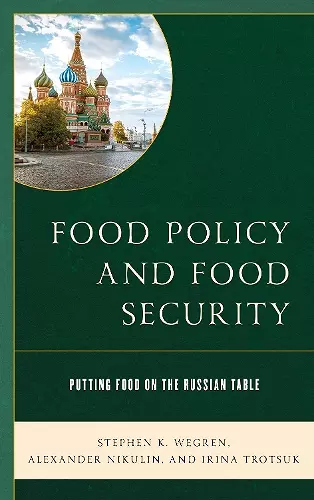Food Policy and Food Security
Putting Food on the Russian Table
Stephen K Wegren author Alexander Nikulin author Irina Trotsuk author
Format:Hardback
Publisher:Lexington Books
Published:28th Feb '18
Currently unavailable, and unfortunately no date known when it will be back

This book provides a comprehensive analysis of Russian food policy. Food policy is defined as the way government policy influences food production and distribution. Russia’s food policy is important for several reasons. The first and most obvious reason is that a dysfunctional food policy is symptomatic of larger political and societal problems. A failing food policy is often the precursor to political instability. Russian food policy is also important is due to the agricultural recovery since 2004 that has allowed Russia to become self-sufficient in grain production. Being food-sufficient in grain means that Russia is not drawing upon global grain supply. Even more important, Russia now produces surpluses and has become a global grain supplier. Moreover, the agricultural recovery has made the country food secure, traditionally defined as having enough food for a healthy life. An analysis of food policy reveals that the structure of food production has changed with the emergence of mega-farms called agroholdings that are horizontally and vertically integrated. Agroholdings represent a concentration of capital and land, with a small number of farms producing large percentages of total food output. The book explores alternatives to the industrial agricultural model by discussing different variants of sustainable agriculture. A final importance of Russian food policy concerns food trade. Russia has become more protectionist since 2012. The food embargo against Western nations (2014-2017) is one example, so too is import substitution that is a core component of food policy. The book demonstrates the politicalization of external food trade. Food trade and denial of access to the Russian market is used as an instrument of foreign policy to punish countries with whom Russia has disagreements. Current Russian policymakers have food resources to augment, support, and extend national interests abroad. Russia historically has cycled through periods of integration and isolation from the West. This book raises the question whether a new normal has arisen that is characterized by the permanent withdrawal from integration, as evidenced by its nationalist and protectionist food policy. The book is entirely original, rich in detail and broad in scope. It is based on field work, survey data, a wide reading of primary sources and the secondary literature, all of which are linked to important policy questions in development studies and food studies. It is destined to become a classic book on Russian food policy.
Wegren, Nikulin, and Trotsuk have tackled a big subject: Russian policies affecting the supply of food in Russia. They have dealt with it comprehensively, displaying a wealth of knowledge and insight and producing a book of real substance. Whether dealing with ‘counter-sanctions’, fast-food trends, large agro-holdings, or ecological sustainability, they deploy a wide range of source material, clear exposition, and shrewd judgement. The subject is both politically and economically important but has been neglected by Western analysts. This is a timely and impressive study. -- Philip Hanson, University of Birmingham
Food Policy and Food Security is a thrilling read unseating the primacy of the politicized perspective as the reigning explanation for the Russian state decisions and activities in the domain of food production and consumption. This is an indispensable and thought-provoking book on the contemporary Russian domestic food policies, external food trade and households food security. The book is full of arresting ideas supported by relevant statistical and sociological data, which makes it a milestone in the study of the current situation and possible future of food security in Russia in local and national, domestic and international dimensions. -- Natalia Shagaida, Russian Academy of National Economy and Public Administration
This book gives a solid and comprehensive overview of Russia’s Food Policy since 2000. Analyzing data until the fall of 2017, it entails an extraordinary actuality. It convincingly explains how Russia succeeded in returning as a global player on the food market by state intervention targeting to reduce dependency on food imports. The study demonstrates the rise of food nationalism and proves that newly founded large-scale agro-holdings profited mostly from the significant state subsidies. The authors competently outline the internal consequences of Russia’s food embargo against the West. Written by leading experts in the field, this book is a must to read for all interested in Russia’s present economy and foreign policy. -- Stephan Merl, Bielefeld University
ISBN: 9781498532372
Dimensions: 236mm x 161mm x 30mm
Weight: 640g
330 pages